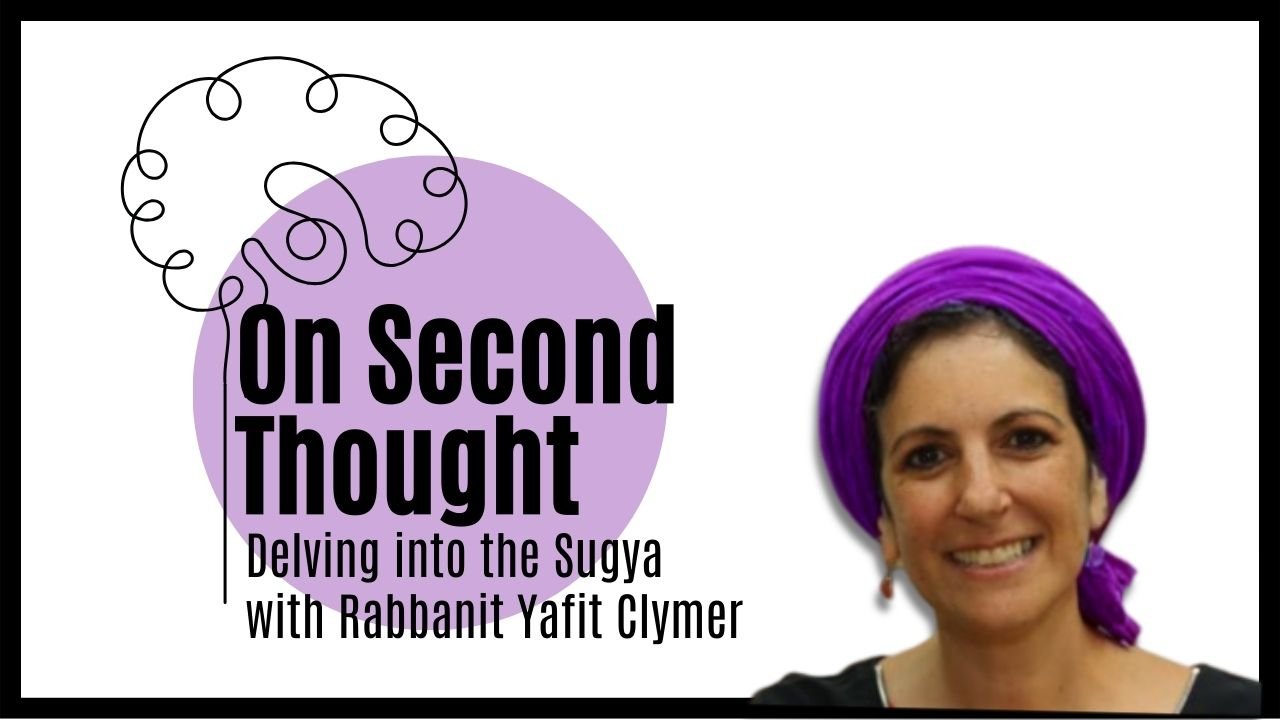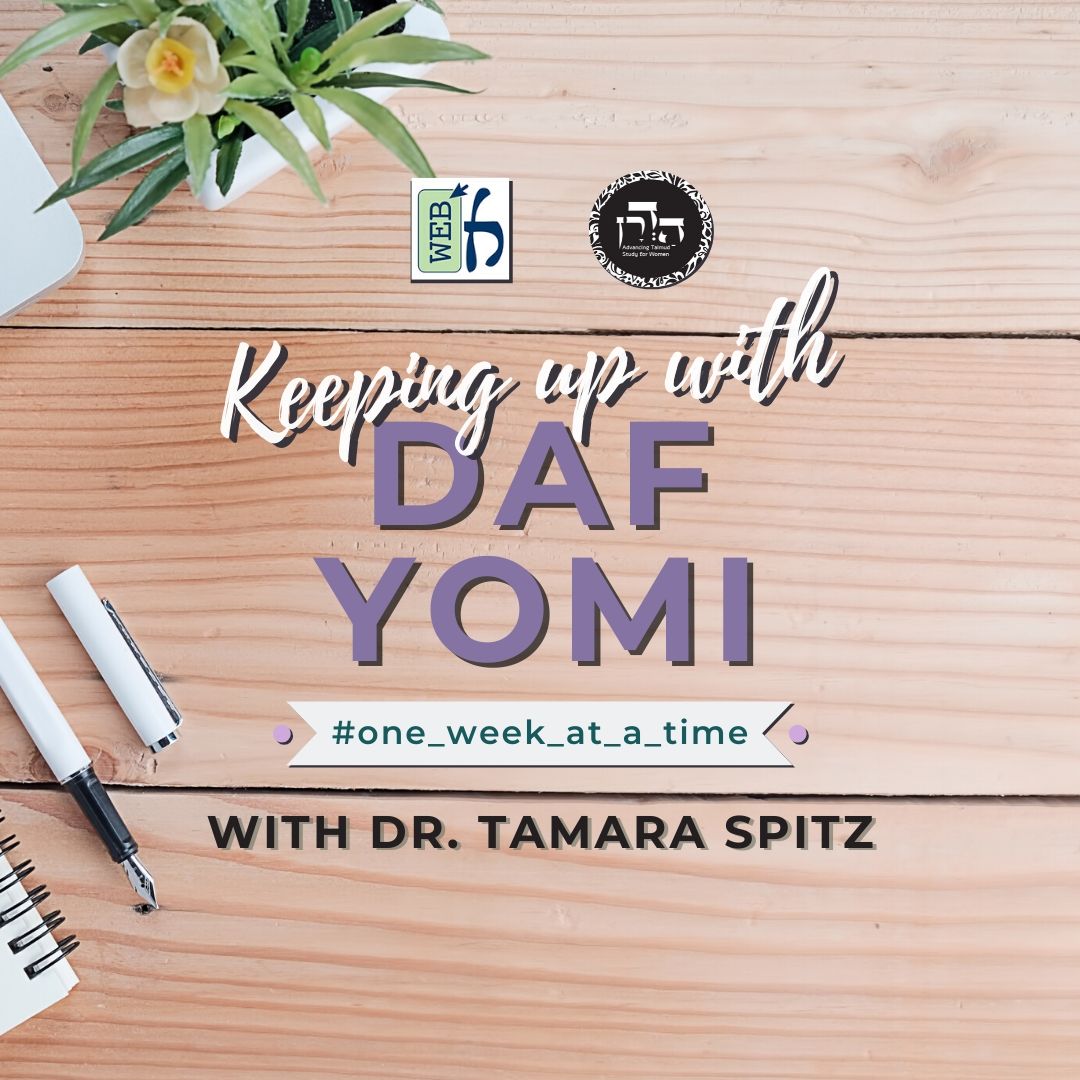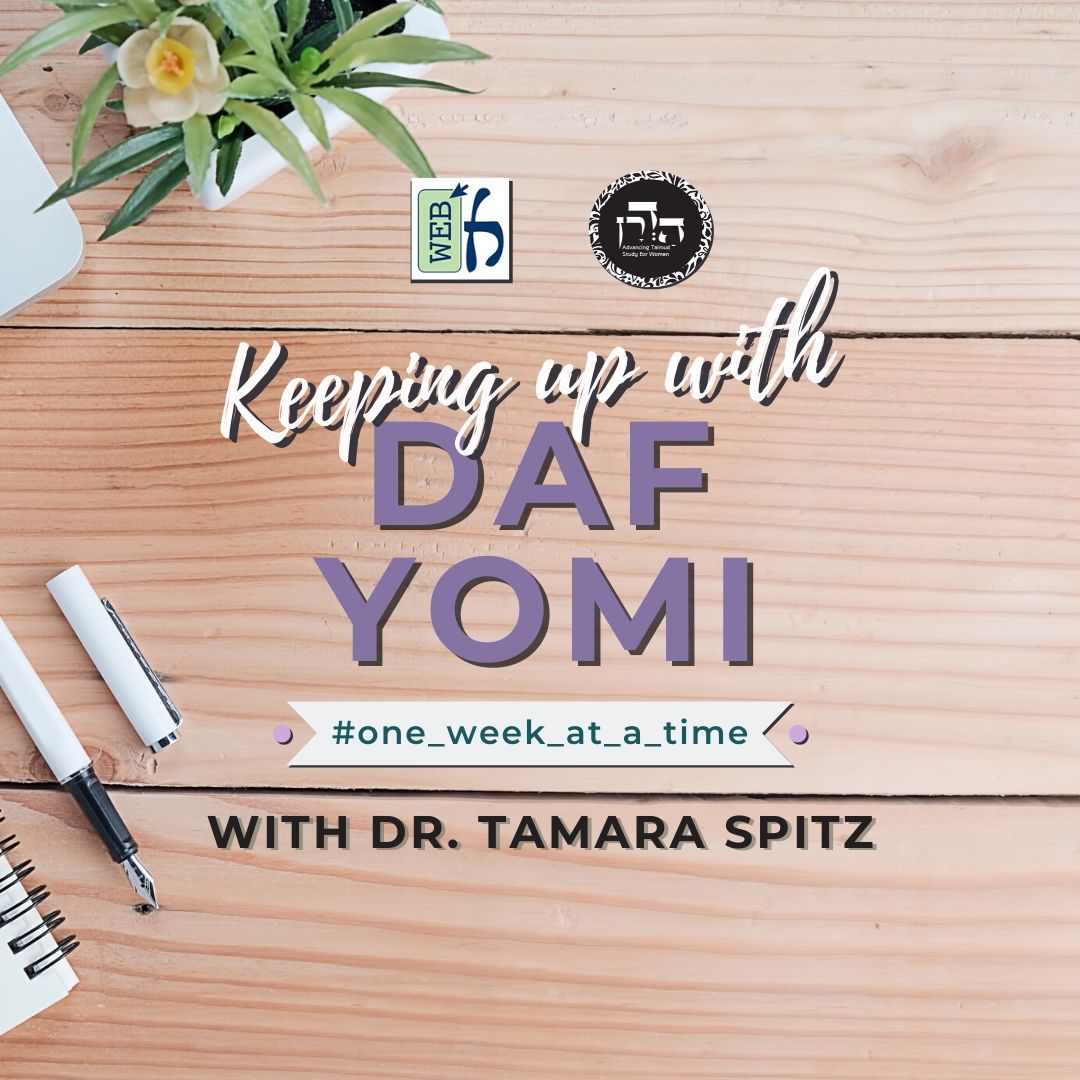If someone knows that someone doesn’t keep a particular mitzva, can one trust them in other areas? Are there particular things they can;t be trusted for or maybe everything? The gemara brings several braitot that discuss the issue of “chaverut” – a type of club that those in it would be very careful about keeping a high level of purity. How does one get accepted into the club? Do talmidei chachamim need to go through a process or do they get in automatically? What about the family of a club member – are they in automatically? What about a married women who was married to a member and then to an am haaretz or vice-versa?
This week’s learning is sponsored for the merit and safety of Haymanut (Emuna) Kasau, who was 9 years old when she disappeared from her home in Tzfat two years ago, on the 16th of Adar, 5784 (February 25, 2024), and whose whereabouts remain unknown.
This week’s learning is dedicated of the safety of our nation, the soldiers and citizens of Israel, and for the liberation of the Iranian people. May we soon see the realization of “ליהודים היתה אורה ושמחה וששון ויקר”.
Want to dedicate learning? Get started here:


Today’s daily daf tools:
This week’s learning is sponsored for the merit and safety of Haymanut (Emuna) Kasau, who was 9 years old when she disappeared from her home in Tzfat two years ago, on the 16th of Adar, 5784 (February 25, 2024), and whose whereabouts remain unknown.
This week’s learning is dedicated of the safety of our nation, the soldiers and citizens of Israel, and for the liberation of the Iranian people. May we soon see the realization of “ליהודים היתה אורה ושמחה וששון ויקר”.
Today’s daily daf tools:
Delve Deeper
Broaden your understanding of the topics on this daf with classes and podcasts from top women Talmud scholars.
New to Talmud?
Check out our resources designed to help you navigate a page of Talmud – and study at the pace, level and style that fits you.
The Hadran Women’s Tapestry
Meet the diverse women learning Gemara at Hadran and hear their stories.
Bekhorot 30
תַּרְבָּא דְּאַטְמָא בְּמַר דְּכַנְתָּא, קַנְסֵיהּ רָבָא לְזַבּוֹנֵי אֲפִילּוּ אַמְגּוֹזֵי. אֲמַר לֵיהּ רַב פָּפָּא לְרָבָא: כְּמַאן? כְּרַבִּי יְהוּדָה? אִי כְּרַבִּי יְהוּדָה, אֲפִילּוּ מַיִם וָמֶלַח נָמֵי!
fat of the kidney adjacent to the thigh, which is forbidden, in place of fat of the intestines, which is permitted. Rava penalized him and prohibited him even from selling nuts. Rav Pappa said to Rava: In accordance with which opinion in the mishna is your ruling? It must be in accordance with the opinion of Rabbi Yehuda. If it is in accordance with the opinion of Rabbi Yehuda, then you should prohibit this butcher from selling even water and salt.
לְעוֹלָם רַבִּי שִׁמְעוֹן, וּבְאִיסּוּרָא דְּגוּפֵיהּ קָנְסִינַן לֵיהּ. סְתָם דַּרְדְּקֵי גְּרוּ בְּאַמְגּוֹזֵי, וְאָזֵיל וּמְשַׁבֵּשׁ לִבְנֵי טַבָּחֵי, וְגָרֵי לְהוּ בְּאַמְגּוֹזֵי, וּמַיְיתוּ לֵיהּ תַּרְבָּא דְּאַטְמָא, וּמְזַבֵּין לֵיהּ בְּמַר דְּכַנְתָּא.
Rava replied: Actually, my ruling is in accordance with the opinion of Rabbi Shimon, who holds that one is suspected only about those items that are related to the prohibition in question. And we are in fact penalizing him with regard to items related to the prohibition itself. How so? Ordinary children are enticed by nuts, and that individual went and misled the children of butchers and enticed them with nuts, and they brought him fat of the kidney that is adjacent to the thigh, and he sold it as though it were fat of the intestines.
מַתְנִי׳ הֶחָשׁוּד עַל הַשְּׁבִיעִית — אֵינוֹ חָשׁוּד עַל הַמַּעַשְׂרוֹת, הֶחָשׁוּד עַל הַמַּעַשְׂרוֹת — אֵינוֹ חָשׁוּד עַל הַשְּׁבִיעִית. הֶחָשׁוּד עַל זֶה וְעַל זֶה — חָשׁוּד עַל הַטְּהָרוֹת, וְיֵשׁ שֶׁהוּא חָשׁוּד עַל הַטְּהָרוֹת — וְאֵינוֹ חָשׁוּד לֹא עַל זֶה וְלֹא עַל זֶה. זֶה הַכְּלָל: הֶחָשׁוּד עַל דָּבָר — לֹא דָּנוֹ וְלֹא מְעִידוֹ.
MISHNA: One who is suspect with regard to the Sabbatical Year is not suspect with regard to tithes; and likewise, one who is suspect with regard to tithes is not suspect with regard to the Sabbatical Year. One who is suspect with regard to this, the Sabbatical Year, or with regard to that, tithes, is suspect with regard to selling ritually impure foods as though they were ritually pure items. But there are those who are suspect with regard to ritually pure items who are not suspect with regard to this, the Sabbatical Year, nor with regard to that, tithes. This is the principle with regard to these matters: Anyone who is suspect with regard to a specific matter may neither adjudicate cases nor testify in cases involving that matter.
גְּמָ׳ מַאי טַעְמָא? שְׁבִיעִית לָא בָּעֲיָא חוֹמָה, מַעֲשֵׂר — כֵּיוָן דְּבָעֵי חוֹמָה, חֲמִיר לֵיהּ.
GEMARA: The mishna teaches that one who is suspect with regard to the Sabbatical Year is not suspect with regard to tithes. The Gemara asks: What is the reason? One is not required to eat produce of the Sabbatical Year within the wall of Jerusalem, and therefore he treats it lightly. As for second tithe, since one is required to eat it only within the wall of Jerusalem, it is possible that it seems more stringent for him, and therefore he is not suspect, despite the suspicions with regard to produce of the Sabbatical Year.
הֶחָשׁוּד עַל הַמַּעֲשֵׂר. מַאי טַעְמָא? מַעֲשֵׂר אִית לֵיהּ פִּדְיוֹן, שְׁבִיעִית — כֵּיוָן דְּקָא מִיתַּסְרָא לֵיהּ וְלֵית לֵיהּ פִּדְיוֹן — חֲמִירָא לֵיהּ.
The mishna teaches: One who is suspect with regard to tithe is not suspect with regard to the Sabbatical Year. The Gemara asks: What is the reason? The Gemara answers: Since there is redemption for tithes, one might treat them lightly. As for produce of the Sabbatical Year, since it is always prohibited to him and there is no redemption of it, it is possible that it seems more stringent for him, and therefore he is not suspect.
הֶחָשׁוּד עַל זֶה וְעַל זֶה. כֵּיוָן דַּחֲשִׁיד אַדְּאוֹרָיְיתָא, כׇּל שֶׁכֵּן אַדְּרַבָּנַן.
The mishna teaches: One who is suspect with regard to this, the Sabbatical Year, or with regard to that, tithes, is suspect with regard to selling ritually impure foods as though they were ritually pure items. The Gemara explains: Since he is suspect with regard to matters that apply by Torah law, all the more so that he is suspect with regard to matters that are by rabbinic law. Eating non-sacred food in a state of ritual purity is an ordinance of the Sages; it does not apply by Torah law. Consequently, he is certainly not trusted with regard to that matter.
וְיֵשׁ חָשׁוּד עַל הַטְּהָרוֹת. מַאי טַעְמָא? נְהִי אַדְּרַבָּנַן חֲשִׁיד, אַדְּאוֹרָיְיתָא לָא חֲשִׁיד. וּרְמִינְהִי: נֶאֱמָן עַל הַטְּהָרוֹת — נֶאֱמָן עַל שְׁבִיעִית, הָא חֲשִׁיד — חֲשִׁיד!
The mishna teaches: But there are those who are suspect with regard to ritually pure items who are not suspect with regard to this, the Sabbatical Year, or with regard to that, tithes. The Gemara asks: What is the reason? Granted, he is suspect with regard to prohibitions that are by rabbinic law, but he is not suspect with regard to prohibitions that are by Torah law. And the Gemara raises a contradiction from a baraita: If one is trusted with regard to ritually pure items he is trusted with regard to produce of the Sabbatical Year. It can be inferred from here that if he is suspect with regard to ritually pure items he is likewise suspect with regard to produce of the Sabbatical Year.
אָמַר רַבִּי אִילְעַי: מַתְנִיתִין כְּשֶׁרְאִינוּהוּ שֶׁנּוֹהֵג בְּצִינְעָא בְּתוֹךְ בֵּיתוֹ.
Rabbi Ilai says: The mishna is referring to a case where they saw him practicing stringencies with regard to produce of the Sabbatical Year and tithes privately, within his home. Since he himself is known to be trustworthy in these matters in private, he is not suspected of violating these prohibitions in his business, despite his lack of trustworthiness with regard to ritual purity.
רַבִּי יַנַּאי בְּרַבִּי יִשְׁמָעֵאל אָמַר: כְּגוֹן דַּהֲוָה חֲשִׁיד לְתַרְוַיְיהוּ, וַאֲתָא קַמֵּי רַבָּנַן וְקַבֵּיל אַתַּרְוַיְיהוּ, וַהֲדַר אִיחֲשַׁד אַחַד מִינַּיְיהוּ, דְּאָמְרִינַן: מִיגּוֹ דַּחֲשִׁיד אַהָא — חֲשִׁיד נָמֵי אַאִידַּךְ.
Rabbi Yannai, son of Rabbi Yishmael, said that there is an alternative answer: The baraita is referring to a case where one was suspect with regard to both ritually pure items and produce of the Sabbatical Year, and he came before the Sages and accepted upon himself that he would observe both of them, and afterward he was suspected with regard to one of them. The reason for the halakha here is that we say: Since he is suspect with regard to this one of them, he is also suspect with regard to the other one. Although one of the prohibitions is more stringent than the other, the court has seen that he cannot be trusted to keep his word about either of them.
אָמַר רַבָּה בַּר בַּר חָנָה אָמַר רַבִּי יוֹחָנָן: זוֹ דִּבְרֵי רַבִּי עֲקִיבָא סְתִימְתָּאָה, אֲבָל חֲכָמִים אוֹמְרִים: חָשׁוּד עַל הַשְּׁבִיעִית — חָשׁוּד עַל הַמַּעֲשֵׂר.
§ The mishna teaches: One who is suspect with regard to the Sabbatical Year is not suspect with regard to tithes. Rabba bar bar Ḥana says that Rabbi Yoḥanan says: This is the statement of Rabbi Akiva, the unattributed. Most unattributed statements of tanna’im were formulated by Rabbi Akiva’s students and reflect his opinions. But the Rabbis say: One who is suspect with regard to produce of the Sabbatical Year is suspect with regard to tithe.
מַאן חֲכָמִים? רַבִּי יְהוּדָה, דִּבְאַתְרֵיהּ דְּרַבִּי יְהוּדָה שְׁבִיעִית חֲמִירָא לְהוּ, דְּהָהוּא דַּהֲוָה קָרֵי לֵיהּ לְחַבְרֵיהּ ״דַּיָּירָא בַּר דַּיָּירְתָּא״, אֲמַר לֵיהּ: תֵּיתֵי לִי דְּלָא אֲכַלִי פֵּירוֹת שְׁבִיעִית כְּוָותָךְ.
The Gemara asks: Who are the Sages referred to here as the Rabbis? It is Rabbi Yehuda, as in Rabbi Yehuda’s locale they considered produce of the Sabbatical Year an especially stringent prohibition. Therefore, if a resident of that place was suspect with regard to the Sabbatical Year, he was certainly not trusted with regard to tithes. As in that locale, if a certain person would call another: A convert, son of a female convert, wishing to insult him, that person would say to him in reply: I have a blessing coming to me, as I do not eat produce of the Sabbatical Year like you do. This indicates that the accusation of eating produce of the Sabbatical Year was a great insult, since they treated the Sabbatical Year stringently.
אִיכָּא דְּאָמְרִי, אָמַר רַבָּה בַּר בַּר חָנָה אָמַר רַבִּי יוֹחָנָן: זוֹ דִּבְרֵי רַבִּי עֲקִיבָא סְתִימְתָּאָה, אֲבָל חֲכָמִים אוֹמְרִים: חָשׁוּד עַל הַמַּעֲשֵׂר חָשׁוּד עַל הַשְּׁבִיעִית. וּמַאן חֲכָמִים? רַבִּי מֵאִיר הִיא, דְּאָמַר: חָשׁוּד לְדָבָר אֶחָד הָוֵי חָשׁוּד לְכׇל הַתּוֹרָה כּוּלָּהּ.
There are those who say that Rabba bar bar Ḥana says that Rabbi Yoḥanan says: This is the statement of Rabbi Akiva, the unattributed. But the Rabbis say: One who is suspect with regard to tithe is suspect with regard to produce of the Sabbatical Year. And who are the Sages referred to here as the Rabbis? It is Rabbi Meir, who says: One who is suspect with regard to one matter is suspect with regard to the entire Torah.
רַבִּי יוֹנָה וְרַבִּי יִרְמְיָה תַּלְמִידֵי רַבִּי זְעֵירָא, וְאָמְרִי לַהּ רַבִּי יוֹנָה וְרַבִּי זְעֵירָא תַּלְמִידֵי רַבִּי יוֹחָנָן, חַד אָמַר: אֲבָל חֲכָמִים אוֹמְרִים חָשׁוּד עַל הַשְּׁבִיעִית
The Gemara relates that Rabbi Yona and Rabbi Yirmeya, who were students of Rabbi Zeira, disagreed about this matter. And some say that it was Rabbi Yona and Rabbi Zeira, students of Rabbi Yoḥanan, who disagreed. One said: But the Rabbis say that one who is suspect with regard to produce of the Sabbatical Year
חָשׁוּד עַל הַמַּעֲשֵׂר, וּמַאן חֲכָמִים? רַבִּי יְהוּדָה, וְחַד אָמַר: הֶחָשׁוּד עַל הַמַּעֲשֵׂר חָשׁוּד עַל הַשְּׁבִיעִית, וּמַאן חֲכָמִים? רַבִּי מֵאִיר.
is suspect with regard to tithe. And who are the Sages referred to here as the Rabbis? It is Rabbi Yehuda, as in his locale they treated the prohibition of produce of the Sabbatical Year stringently. And the other one says: One who is suspect with regard to tithe is suspect with regard to produce of the Sabbatical Year. And who are the Sages referred to here as the Rabbis? It is Rabbi Meir.
דְּתַנְיָא: עַם הָאָרֶץ שֶׁקִּיבֵּל עָלָיו דִּבְרֵי חֲבֵירוּת, וְנֶחְשַׁד לְדָבָר אֶחָד — נֶחְשַׁד לְכׇל הַתּוֹרָה כּוּלָּהּ, דִּבְרֵי רַבִּי מֵאִיר. וַחֲכָמִים אוֹמְרִים: אֵינוֹ נֶחְשָׁד אֶלָּא לְאוֹתוֹ דָּבָר בִּלְבַד.
As it is taught in a baraita (Tosefta, Demai 2:4): With regard to an am ha’aretz, i.e., one who is unreliable with regard to ritual impurity and tithes, who accepts upon himself the commitment to observe the matters associated with ḥaver status, i.e., that he will be stringent in all matters observed by ḥaverim, including teruma, tithes, and ḥalla, and also undertake to eat only food that is ritually pure, and the Sages accepted him as trustworthy but subsequently he was suspected with regard to one matter in which others saw him act improperly, he is suspected with regard to the entire Torah. This is the statement of Rabbi Meir. And the Rabbis say: He is suspected only with regard to that particular matter.
הַגֵּר שֶׁקִּיבֵּל עָלָיו דִּבְרֵי תוֹרָה, אֲפִילּוּ נֶחְשַׁד לְדָבָר אֶחָד — הָוֵי חָשׁוּד לְכׇל הַתּוֹרָה כּוּלָּהּ, וַהֲרֵי הוּא כְּיִשְׂרָאֵל מְשׁוּמָּד. נָפְקָא מִינַּהּ, דְּאִי קַדֵּישׁ — קִידּוּשָׁיו קִידּוּשִׁין.
It is also taught in a baraita (Tosefta, Demai 2:4): With regard to a convert who accepted upon himself upon his conversion matters of Torah, i.e., all of the mitzvot, even if he is suspect with regard to one matter alone, he is suspect with regard to the entire Torah, and he is considered like a Jewish transgressor [meshummad], who habitually transgresses the mitzvot. The Gemara explains that the practical difference resulting from the fact that he is considered like a Jewish transgressor is that if he betroths a woman, his betrothal is a valid betrothal, and they are married. Although he is suspect with regard to the entire Torah, he does not return to his prior gentile status.
תָּנוּ רַבָּנַן: הַבָּא לְקַבֵּל דִּבְרֵי חֲבֵירוּת, חוּץ מִדָּבָר אֶחָד — אֵין מְקַבְּלִין אוֹתוֹ. גּוֹי שֶׁבָּא לְקַבֵּל דִּבְרֵי תוֹרָה, חוּץ מִדָּבָר אֶחָד — אֵין מְקַבְּלִין אוֹתוֹ. רַבִּי יוֹסֵי בְּרַבִּי יְהוּדָה אוֹמֵר: אֲפִילּוּ דִּקְדּוּק אֶחָד מִדִּבְרֵי סוֹפְרִים.
The Sages taught in a baraita: In the case of one who comes to accept upon himself the commitment to observe the matters associated with ḥaver status except for one matter, which he does not wish to observe, he is not accepted, and he is not trustworthy even with regard to those matters that he does wish to accept upon himself. Likewise, in the case of a gentile who comes to convert and takes upon himself to accept the words of Torah except for one matter, he is not accepted as a convert. Rabbi Yosei, son of Rabbi Yehuda, says: Even if he refuses to accept one detail of rabbinic law, he is not accepted.
וְכֵן בֶּן לֵוִי שֶׁבָּא לְקַבֵּל דִּבְרֵי לְוִיָּה, וְכֹהֵן שֶׁבָּא לְקַבֵּל דִּבְרֵי כְהוּנָּה, חוּץ מִדָּבָר אֶחָד — אֵין מְקַבְּלִין אוֹתוֹ, שֶׁנֶּאֱמַר: ״הַמַּקְרִיב אֶת דַּם הַשְּׁלָמִים וְגוֹ׳״, הָעֲבוֹדָה הַמְּסוּרָה לִבְנֵי אַהֲרֹן, כׇּל כֹּהֵן שֶׁאֵינוֹ מוֹדֶה בָּהּ — אֵין לוֹ חֵלֶק בַּכְּהוּנָּה.
The baraita continues: And similarly, in the case of a Levite who comes to accept the matters of a Levite, or a priest who comes to accept the matters of priesthood, except for one matter, he is not accepted. As it is stated: “He among the sons of Aaron, that sacrifices the blood of the peace offerings, and the fat, shall have the right thigh for a portion” (Leviticus 7:33). This means that with regard to the Temple service, which is handed over to the sons of Aaron, any priest who does not admit to it in its entirety has no share in the priesthood.
תָּנוּ רַבָּנַן: הַבָּא לְקַבֵּל דִּבְרֵי חֲבֵירוּת, אִם רְאִינוּהוּ שֶׁנּוֹהֵג בְּצִינְעָה בְּתוֹךְ בֵּיתוֹ — מְקַבְּלִין אוֹתוֹ, וְאַחַר כָּךְ מְלַמְּדִין אוֹתוֹ. וְאִם לָאו — מְלַמְּדִין אוֹתוֹ, וְאַחַר כָּךְ מְקַבְּלִין אוֹתוֹ. רַבִּי שִׁמְעוֹן בֶּן יוֹחַי אוֹמֵר: בֵּין כָּךְ וּבֵין כָּךְ מְקַבְּלִין אוֹתוֹ, וְהוּא לָמֵד כְּדַרְכּוֹ וְהוֹלֵךְ.
The Gemara continues on a similar topic. The Sages taught in a baraita: In the case of one who comes to accept upon himself a commitment to observe the matters associated with ḥaver status, if we have seen that he practices such matters in private, within his home, he is accepted, and afterward he is taught the precise details of being a ḥaver. But if we have not seen him act as a ḥaver in his home, he is taught first and afterward accepted. Rabbi Shimon ben Yoḥai says: Whether in this case or that case, he is first accepted, and he then continues to learn in the usual manner, i.e., as a ḥaver he learns from others how to behave.
תָּנוּ רַבָּנַן: מְקַבְּלִין לִכְנָפַיִם, וְאַחַר כָּךְ מְקַבְּלִין לִטְהָרוֹת, וְאִם אָמַר: ״אֵינִי מְקַבֵּל אֶלָּא לִכְנָפַיִם״ — מְקַבְּלִין אוֹתוֹ. קִיבֵּל לַטְּהָרוֹת וְלֹא קִיבֵּל לַכְּנָפַיִם — אַף לַטְּהָרוֹת לֹא קִיבֵּל.
The Sages taught in a baraita: An am ha’aretz who wishes to become a ḥaver is accepted first with regard to hands, i.e., he is presumed to be stringent concerning the ritual purity of his hands by making sure to wash his hands before handling pure items, and afterward he is accepted as trustworthy for purity in general. And if he says: I wish to accept purity only with regard to hands, he is accepted for this. If he wishes to accept upon himself the stringencies of a ḥaver with regard to ritual purity but he does not accept upon himself the stringencies with regard to hands, i.e., to wash his hands, which is a simple act, he is not accepted even for purity in general.
תָּנוּ רַבָּנַן: עַד כַּמָּה מְקַבְּלִין אוֹתוֹ? בֵּית שַׁמַּאי אוֹמְרִים: לְמַשְׁקִין — שְׁלֹשִׁים יוֹם, לִכְסוּת — שְׁנֵים עָשָׂר חוֹדֶשׁ. וּבֵית הִלֵּל אוֹמְרִים: אֶחָד זֶה וְאֶחָד זֶה — לִשְׁנֵים עָשָׂר חוֹדֶשׁ.
The Sages taught in a baraita: Until when is he accepted, i.e., how much time must elapse before he is considered trustworthy as a ḥaver? Beit Shammai say: With regard to liquids, thirty days. With regard to impurity of clothing, about which ḥaverim would be careful as well, twelve months. And Beit Hillel say: Both with regard to this, liquids, and that, clothing, he must maintain the practice for twelve months before he is fully accepted as a ḥaver.
אִם כֵּן, הָוֵה לֵיהּ מִקּוּלֵּי בֵּית שַׁמַּאי וּמֵחוּמְרֵי בֵּית הִלֵּל, אֶלָּא בֵּית הִלֵּל אוֹמְרִים: אֶחָד זֶה וְאֶחָד זֶה לִשְׁלשִׁים.
The Gemara raises a difficulty: If so, this is one of the rare cases of the leniencies of Beit Shammai and of the stringencies of Beit Hillel, and yet it is not included in tractate Eduyyot, which lists all of the cases where Beit Shammai are more lenient than Beit Hillel. Rather, the text of the baraita must be emended so that it reads: Beit Hillel say: Both with regard to this, liquids and that, clothing, he must maintain the practice for thirty days before he is fully accepted as a ḥaver.
(סִימָן: חָבֵר, תַּלְמִיד, תְּכֵלֶת, מֶכֶס, חָזַר, גַּבַּאי, בְּעַצְמוֹ).
§ The Gemara provides a mnemonic to remember the topics from here until the end of the chapter: Ḥaver; student; sky-blue dye [tekhelet]; tax; return; tax collector; by himself.
תָּנוּ רַבָּנַן: הַבָּא לְקַבֵּל דִּבְרֵי חֲבֵירוּת — צָרִיךְ לְקַבֵּל בִּפְנֵי שְׁלֹשָׁה חֲבֵירִים, וּבָנָיו וּבְנֵי בֵּיתוֹ אֵינָן צְרִיכִין לְקַבֵּל בִּפְנֵי שְׁלֹשָׁה חֲבֵירִים. רַבָּן שִׁמְעוֹן בֶּן גַּמְלִיאֵל אוֹמֵר: אַף בָּנָיו וּבְנֵי בֵיתוֹ צְרִיכִין לְקַבֵּל בִּפְנֵי שְׁלֹשָׁה חֲבֵירִים, לְפִי שֶׁאֵינוֹ דּוֹמֶה חָבֵר שֶׁקִּיבֵּל לְבֶן חָבֵר שֶׁקִּיבֵּל.
The Sages taught in a baraita: One who comes to accept upon himself a commitment to observe the matters associated with ḥaver status must accept it in the presence of three ḥaverim. But his children and the members of his household are not required to accept the status of ḥaver separately in the presence of three ḥaverim. Rabban Shimon ben Gamliel says: Even his children and the members of his household must accept the status of ḥaver in the presence of three ḥaverim, because a ḥaver, who accepted it himself in the presence of three others, is not comparable to the son of a ḥaver, who accepted that status only due to his father but did not accept it himself explicitly, and their accepting the status not in the presence of three people is insufficient.
תָּנוּ רַבָּנַן: הַבָּא לְקַבֵּל דִּבְרֵי חֲבֵירוּת — צָרִיךְ לְקַבֵּל בִּפְנֵי שְׁלֹשָׁה חֲבֵירִים, וַאֲפִילּוּ תַּלְמִיד חָכָם צָרִיךְ לְקַבֵּל בִּפְנֵי שְׁלֹשָׁה חֲבֵירִים. זָקֵן וְיוֹשֵׁב בִּישִׁיבָה — אֵינוֹ צָרִיךְ לְקַבֵּל בִּפְנֵי שְׁלֹשָׁה חֲבֵירִים, שֶׁכְּבָר קִיבֵּל עָלָיו מִשָּׁעָה שֶׁיָּשַׁב. אַבָּא שָׁאוּל אוֹמֵר: אַף תַּלְמִיד חָכָם אֵינוֹ צָרִיךְ לְקַבֵּל בִּפְנֵי שְׁלֹשָׁה חֲבֵירִים, וְלֹא עוֹד אֶלָּא שֶׁאֲחֵרִים מְקַבְּלִין לְפָנָיו.
The Sages taught in a baraita: One who comes to accept upon himself a commitment to observe the matters associated with ḥaver status must accept it in the presence of three ḥaverim, and even a Torah scholar who wishes to become a ḥaver must accept the status of ḥaver in the presence of three ḥaverim. But an elder who sits and studies Torah in a yeshiva is not required to accept the status of ḥaver in the presence of three ḥaverim, as he already accepted it upon himself from the moment he sat and dedicated himself to study Torah in yeshiva. Abba Shaul says: Even a Torah scholar is not required to accept the status of ḥaver in the presence of three ḥaverim; and not only does he have the status of ḥaver without an explicit declaration in the presence of three ḥaverim, but others can accept that they wish to become a ḥaver in his presence.
אָמַר רַבִּי יוֹחָנָן: בִּימֵי בְּנוֹ שֶׁל רַבִּי חֲנִינָא בֶּן אַנְטִיגְנוֹס נִשְׁנֵית מִשְׁנָה זוֹ. רַבִּי יְהוּדָה וְרַבִּי יוֹסֵי אִיסְתַּפַּק לְהוּ מִילְּתָא בִּטְהָרוֹת, שַׁדַּרוּ רַבָּנַן לְגַבֵּי בְּנוֹ שֶׁל רַבִּי חֲנִינָא בֶּן אַנְטִיגְנוֹס, אֵזִילוּ אֱמַרוּ לֵיהּ: לְעַיֵּין בַּהּ. אַשְׁכְּחוּהּ דְּקָא טָעֵין טְהָרוֹת, אוֹתֵיב רַבָּנַן מִדִּידֵיהּ לְגַבַּיְיהוּ, וְקָאֵי אִיהוּ לְעַיּוֹנֵי בַּהּ.
Rabbi Yoḥanan says: This mishna, i.e., the ruling that a Torah scholar must declare his intent to become a ḥaver in the presence of three ḥaverim, was taught in the days of the son of Rabbi Ḥanina ben Antigonus. At that time, Rabbi Yehuda and Rabbi Yosei were uncertain about a certain matter of ritual purity. The Sages sent a delegation of their students to the son of Rabbi Ḥanina ben Antigonus and told them to go and tell him to examine this matter. The students found him while he was carrying items that were ritually pure. The son of Rabbi Ḥanina ben Antigonus seated Sages from his own yeshiva next to the students who came to ask the question, because he did not trust these students to keep his items pure. And he stood and examined the matter.
אֲתוֹ אָמְרִי לֵיהּ לְרַבִּי יְהוּדָה וְרַבִּי יוֹסֵי, אֲמַר לְהוּ רַבִּי יְהוּדָה: אָבִיו שֶׁל זֶה בִּיזָּה תַּלְמִידֵי חֲכָמִים, אַף הוּא מְבַזֶּה תַּלְמִידֵי חֲכָמִים!
The students returned and came and told Rabbi Yehuda and Rabbi Yosei that the son of Rabbi Ḥanina ben Antigonus had treated them as though they had the status of amei ha’aretz. Rabbi Yehuda said to them in anger: This one’s father, i.e., Rabbi Ḥanina ben Antigonus, degraded Torah scholars by not trusting them with matters of ritual purity. And he too, the son of Rabbi Ḥanina ben Antigonus, degrades Torah scholars.
אָמַר לוֹ רַבִּי יוֹסֵי: כְּבוֹד זָקֵן יְהֵא מוּנָּח בִּמְקוֹמוֹ, אֶלָּא מִיּוֹם שֶׁחָרַב בֵּית הַמִּקְדָּשׁ נָהֲגוּ כֹּהֲנִים סִילְסוּל בְּעַצְמָן, שֶׁאֵין מוֹסְרִין אֶת הַטְּהָרוֹת לְכׇל אָדָם.
Rabbi Yosei said to him: Let the honor of the elder, i.e., both the father and son, be left in its place. He did not act in this manner to degrade Torah scholars. Rather, from the day the Temple was destroyed, the priests were accustomed to act with a higher standard for themselves, and they decided that they will not pass ritually pure items to any other person. Therefore, the son of Rabbi Ḥanina, as a priest, acted appropriately.
תָּנוּ רַבָּנַן: חָבֵר שֶׁמֵּת — אִשְׁתּוֹ וּבָנָיו וּבְנֵי בֵּיתוֹ הֲרֵי הֵן בְּחֶזְקָתָן, עַד שֶׁיֵּחָשֵׁדוּ. וְכֵן חָצֵר שֶׁמּוֹכְרִין בָּהּ תְּכֵלֶת — הֲרֵי הִיא בְּחֶזְקָתָהּ, עַד שֶׁתִּיפָּסֵל.
The Sages taught in a baraita: In the case of a ḥaver that died, his wife and children and members of his household retain their presumptive status until they are suspected of engaging in inappropriate deeds. And similarly, in the case of a courtyard in which one sells sky-blue dye, it retains its presumptive status as a place in which fit sky-blue dye is sold until it is disqualified due to the merchant’s unscrupulous behavior.
תָּנוּ רַבָּנַן: אֵשֶׁת עַם הָאָרֶץ שֶׁנִּשֵּׂאת לְחָבֵר, וְכֵן בִּתּוֹ שֶׁל עַם הָאָרֶץ שֶׁנִּשֵּׂאת לְחָבֵר, וְכֵן עַבְדּוֹ שֶׁל עַם הָאָרֶץ שֶׁנִּמְכַּר לְחָבֵר — כּוּלָּן צְרִיכִין לְקַבֵּל דִּבְרֵי חֲבֵירוּת בַּתְּחִלָּה. אֲבָל אֵשֶׁת חָבֵר שֶׁנִּשֵּׂאת לְעַם הָאָרֶץ, וְכֵן בִּתּוֹ שֶׁל חָבֵר שֶׁנִּשֵּׂאת לְעַם הָאָרֶץ, וְכֵן עַבְדּוֹ שֶׁל חָבֵר שֶׁנִּמְכַּר לְעַם הָאָרֶץ — אֵין צְרִיכִין לְקַבֵּל דִּבְרֵי חֲבֵירוּת בַּתְּחִלָּה.
The Sages taught in a baraita: The former wife an am ha’aretz who later marries a ḥaver, and likewise the daughter of an am ha’aretz who marries a ḥaver, and likewise the slave of an am ha’aretz who is sold to a ḥaver, must all accept upon themselves a commitment to observe the matters associated with ḥaver status. But with regard to the former wife of a ḥaver who later marries an am ha’aretz, and likewise the daughter of a ḥaver who marries an am ha’aretz, and likewise the slave of a ḥaver who was sold to an am ha’aretz, these people need not accept upon themselves a commitment to observe the matters associated with ḥaver status ab initio, as each of them is already accustomed to behave as a ḥaver.
רַבִּי מֵאִיר אוֹמֵר: אַף הֵן צְרִיכִין לְקַבֵּל עֲלֵיהֶן דִּבְרֵי חֲבֵירוּת לְכַתְּחִלָּה. רַבִּי שִׁמְעוֹן בֶּן אֶלְעָזָר אוֹמֵר מִשּׁוּם רַבִּי מֵאִיר: מַעֲשֶׂה בְּאִשָּׁה אַחַת שֶׁנִּשֵּׂאת לְחָבֵר וְהָיְתָה קוֹמַעַת לוֹ תְּפִילִּין עַל יָדוֹ, נִשֵּׂאת לְעַם הָאָרֶץ וְהָיְתָה קוֹשֶׁרֶת לוֹ קִשְׁרֵי מוֹכֵס עַל יָדוֹ.
The baraita continues: Rabbi Meir says: They too must accept upon themselves a commitment to observe the matters associated with ḥaver status ab initio. And similarly, Rabbi Shimon ben Elazar would illustrate this point and say in the name of Rabbi Meir: There was an incident involving a certain woman who married a ḥaver and would tie [koma’at] for him phylacteries on his hand, and she later married a tax collector and would tie for him tax seals on his hand, which shows that her new husband had a great influence on her level of piety.







































